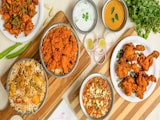India is facing a silent but fast-growing crisis: obesity. Recent national surveys and peer-reviewed studies show a clear trend: a large and growing proportion of Indians carry excess body fat, and that fat is showing up in the places that matter most for health, around the belly and inside organs. The result is an alarming surge in type-2 diabetes, hypertension, heart disease and other non-communicable diseases (NCDs) at younger ages than before. Weight loss ultimately requires energy balance: burn more than you consume. But the quality of what you eat affects appetite, metabolic health and long-term success.
Evidence shows that whole-food, plant-forward (vegetarian) diets that emphasise legumes, whole grains, vegetables, fruits and minimal ultra-processed foods can help reduce weight and improve cardiometabolic markers, particularly when paired with portion control and modest reductions in dietary fat and refined carbs. Meta-analyses of intervention trials report modest but consistent weight loss with vegetarian and plant-based patterns. National guidelines from India's nutrition institutes also emphasise variety, portion control, less added sugar and oils, and regular physical activity as pillars for healthy weight.
But there is a caveat: Calorie targets depend on age, sex, current weight, activity level and medical conditions. Before starting a structured weight-loss plan, people with existing chronic disease, pregnant or breastfeeding women, and older adults should consult a doctor or registered dietitian. The plan below is a beginner, portable, vegetarian template geared to busy Indian adults aiming for gradual, sustainable weight loss, built on widely recommended food principles. Think of it as a starting map and adjust calories and portions with a professional as needed.
Beginner's vegetarian weight loss diet plan for busy Indians
This diet plan contains approximate daily calories of 1400–1600 kcal but adjust upward if you're very active or under medical guidance.
Key rules to follow every day
- Aim for 3 balanced meals + 1–2 small snacks.
- Prioritise protein at every meal like dals, paneer, curd, low-fat milk, sprouted legumes, eggs if ovo-vegetarian.
- Prefer whole grains like millet, brown rice, whole wheat over refined white rice/maida when preparing roti, etc.
- Keep visible fat like ghee and oil moderate. Use 1–2 tsp per person per meal where possible.
- Avoid sugary drinks and deep-fried snacks; choose fresh fruit, roasted chana, unsalted nuts or buttermilk.
- Drink water regularly and aim for 2–3 litres (more if active or in heat).
- Walk 20–30 minutes a day or include short exercise sessions; movement helps preserve muscle while losing fat.
Sample daily office-friendly schedule for weekdays
After waking up
1 glass warm water with lemon.
6–8 soaked almonds or 1 small banana (if you need early energy).
Breakfast (within 60–90 min of waking)
Option A: 2 small besan/vegetable chillas + 1 bowl low-fat curd + mint chutney.
Option B: 1 medium bowl upma with vegetables + 1 cup green tea or black tea (no sugar).
Aim: protein + fibre to keep you full.
Mid-morning snack
1 apple/orange or 1 small bowl of papaya + 6–8 roasted chana or a homemade roasted makhana pack.
Lunch
1–2 whole wheat rotis (or 1 small cup cooked millet/rice)
1 bowl dal (or 1 cup chole/rajma/soy curry)
1 bowl mixed vegetable sabzi (cooked with minimal oil)
1 small bowl salad (cucumber, tomato, carrot) + 1 small cup curd/buttermilk.
Evening (snack)
1 cup green tea + 1 besan or ragi pancake OR 1 small bowl sprouts chaat with lemon and onions.
Dinner
Try consuming this at least 2-3 hours before going to bed.
1–2 rotis or mixed grain dosa + vegetable sambar OR 1 bowl vegetable khichdi + salad.
Avoid heavy gravies and fried sides.
Busy-week hacks
- Cook dals/grains in bulk (weekend) and portion into tiffins.
- Use idli/dosa batter and make instant uttapams or steamed idlis as they are portable and low-oil.
- Keep ready sprouted moong or roasted chana for office hunger pangs.
- Swap one cooked meal per day with a large salad bowl that includes paneer/boiled egg/sprouts for protein.
Aim for slow, steady weight loss (0.5–1 kg/week) as it's more sustainable and protects muscle mass. Along with this, focus on behaviour: sleep, stress management and consistent physical activity are as important as the plate. If you have diabetes, hypertension, hypothyroidism or are on drugs, consult your clinician before changing diet or medication.
Disclaimer: This content including advice provides generic information only. It is in no way a substitute for a qualified medical opinion. Always consult a specialist or your doctor for more information. NDTV does not claim responsibility for this information.
References:
National Family Health Survey (NFHS-5), India (2019–21).
Lancet / The Lancet Regional Health — South Asia: “Abdominal obesity in India” (analysis using NFHS-5 data).
National Institute of Nutrition (NIN), Dietary Guidelines for Indians (2024; NIN/ICMR publications).
ICMR-NIN Recommended Dietary Allowances (RDA) for Indians (2020).
WHO Expert Consultation: “Appropriate body-mass index for Asian populations and its implications” (Lancet/WHO, 2004).
NCBI / PubMed articles and reviews on the “South Asian phenotype”, “thin-fat” obesity, and metabolic risk among Asian Indians.
Systematic reviews and meta-analyses on vegetarian/plant-based diets and weight loss (PubMed/PMC).















